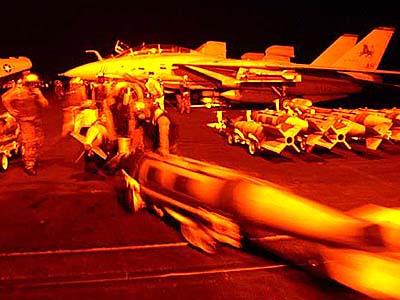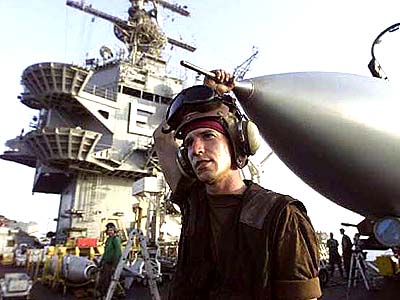Home |
Contents |
Photos |
News |
Reviews |
Store |
Forum |
ICI |
Educators |
Fans |
Contests |
Help |
FAQ |
Info


War Song of America the Strong
(10/3/01)
 We've heard Bush and other leaders talk about how America is strong. "Our country is strong," Dubya said in his first speech after the 9/11 attacks. In girding us for war, he might very well have quoted these famous lines on being strong in conflict:
We've heard Bush and other leaders talk about how America is strong. "Our country is strong," Dubya said in his first speech after the 9/11 attacks. In girding us for war, he might very well have quoted these famous lines on being strong in conflict:
The race is to the swift;
The battle to the strong.
The irony is that these lines come from a rabidly antiwar poem, War Song, by John Davidson (1857-1909). The full first stanza is:
In anguish we uplift
A new unhallowed song:
The race is to the swift;
The battle to the strong.
Unhallowed and sung in anguish, this song can't be good. It isn't. The next stanza identifies the "we" who are singing so gloomily:
Of old it was ordained
That we, in packs like curs,
Some thirty million trained
And licensed murderers....
So "we" are soldiers. And what are "we" singing about? War, of course. War, glorious war, described as
The augury, the dawn
Of golden times of grace;
The true catholicon,
And blood-bath of the race.
So "we" are "licensed murderers," glorying in the "blood-bath of the race." And we also sing of our swiftness and strength, which win us races and battles. Here's more on who "we," the swift and strong, are:
We spell-bound armies then,
Huge brutes in dumb distress,
Machines compact of men
Who once had consciences....
So our might has made us "spell-bound." Or as another line puts it, "Like zanies rigged, and chained." We're drugged by "lust for havoc," lit by "a blood-red blaze of wrath," to quote more lines. If we ever had a conscience, it's gone, destroyed by our obsession with destruction.
Hmm. Sounds like a lot like the supposed fanatics we're fighting, eh?

And our strength has made us "huge brutes in dumb distress." Imagine a big, blundering war machine, stumbling about, lost. Imagine the USA in Vietnam or the USSR in Afghanistan, if that helps.
And what's the outcome when "we" go to war? More war. More war, more blood, more corpses:
Opposing ordnance roar
Across the swaths of slain,
And blood in torrents pour
In vain — always in vain,
For war breeds war again!
So the strong kill each other and die. Whether they're dinosaurs or gladiators, the "huge brutes" circle each other in "dumb distress." They stab and punch, kick and slash, until nothing is left but blood and guts.
No wonder the meek shall inherit the earth. They're the only ones smart enough to avoid this stupidity. While the "strong" see life as a battle, and therefore fight to the end, the meek duck and weave, play the angles, shift the paradigm. They find a way to avoid pointless battles, which they'll lose, and skip straight to the winner's circle.
Think of the scheming Paul Newman outsmarting the shark-like Robert Shaw in The Sting. Or of Captain Kirk outsmarting much stronger opponents: Klingons, Khan, even Spock a few times. Think of the Roadrunner outsmarting the Coyote.
Natives knew it first
This is also the philosophy of indigenous cultures. Raised as part of nature, they realized humans couldn't defeat forces like the sun, wind, and rain. They kept their place, remained humble, in the face of all-powerful nature.
But knowing their limitations didn't mean accepting misery or defeat. No, they used the abilities at hand to mediate with the great forces. They prayed to, pleaded with, and cajoled the spirits of nature.
If necessary, they acted against the spirits—but with stealth, not strength. Like the trickster of legend, they outsmarted the powers-that-be. The Promethean myth of stealing light or fire by cunning, rather than taking it by force, is the classic indigenous paradigm.
Other non-Western cultures also seem to understand this mindset. In contrast to European cultures, Asian cultures seek a balance between forces—yin and yang—not domination. The whole idea of Zen, of martial arts (using an opponent's strength against him), is fundamentally non-Western.
Conclusion
Because they have no choice, the meek must be inventive to survive. America and other Western cultures may be strong, but strength is useless when you're mired in quicksand. The trick is to avoid sand traps in the first place.
After the "war song" is over
"People try hard to avoid the subject altogether, as if they are ashamed of having been swept up in a delusion, which of course they had."
Related links
Victor or victim: our new national anthem?
America the warrior society
Winning through nonviolence
Violence in America
America's cultural mindset
* More opinions *
|
|
. . .
|

|
Home |
Contents |
Photos |
News |
Reviews |
Store |
Forum |
ICI |
Educators |
Fans |
Contests |
Help |
FAQ |
Info
All material © copyright its original owners, except where noted.
Original text and pictures © copyright 2007 by Robert Schmidt.
Copyrighted material is posted under the Fair Use provision of the Copyright Act,
which allows copying for nonprofit educational uses including criticism and commentary.
Comments sent to the publisher become the property of Blue Corn Comics
and may be used in other postings without permission.
 We've heard Bush and other leaders talk about how America is strong. "Our country is strong," Dubya said in his first speech after the 9/11 attacks. In girding us for war, he might very well have quoted these famous lines on being strong in conflict:
We've heard Bush and other leaders talk about how America is strong. "Our country is strong," Dubya said in his first speech after the 9/11 attacks. In girding us for war, he might very well have quoted these famous lines on being strong in conflict:
